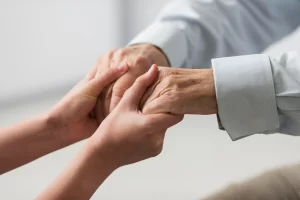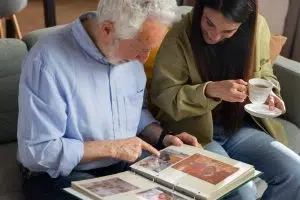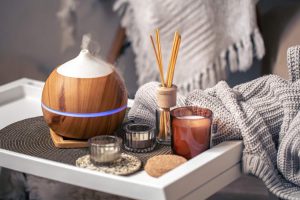Gifts for a Loved One in a Long-Term-Care Facility
Gifts for a Loved One in a Long-Term-Care Facility
For birthdays, holidays, or any day, choosing gifts for a loved one who lives in a long-term care facility, assisted living residence, or nursing home is a great way to add a spark of interest and delight to their life. When someone is not as physically or mentally active anymore, deciding on the perfect present can include uncertainty and worry that you pick something that causes problems instead of happy feelings. Of course, each individual will have specific interests and abilities that make one gift better. These ideas can spark your imagination and help you choose the perfect one.
Comfort Items – Blankets, Pillows, and More
Care facilities rarely match the comfort of a personal home. Consider bringing items that transform institutional spaces into personalized sanctuaries. Soft throw blankets in cheerful patterns or handmade afghans serve dual purposes, adding visual warmth while providing practical comfort during chilly days. Plush pillows create both decorative accents and supportive comfort for relaxation hours. These thoughtful comfort items can be especially soothing gifts for someone who lost a loved one and is adjusting to major life changes or living with grief within the facility.
Cozy Comforts for Every Season
Many gifts for terminally ill women and men focus on physical comfort, which explains why specialized neck pillows prove so popular. These ergonomic supports alleviate discomfort while sitting in facility chairs or beds. Weighted blankets offer gentle pressure that many find soothing, particularly those experiencing anxiety.
Fuzzy slipper socks with non-slip bottoms allow safe movement while keeping feet warm. Plush toys aren’t solely for children – many older adults find comfort in soft companions, especially those with dementia who benefit from sensory stimulation. These tactile objects provide both comfort and practical warmth.
Specialized Comfort Solutions
For residents who spend significant time in wheelchairs, consider specialized cushions designed for pressure relief or lap blankets sized perfectly for wheelchair use. Memory foam seat cushions distribute weight evenly, reducing discomfort during extended sitting periods. When selecting any fabric item, choose materials that withstand frequent washing while maintaining softness.
Personal Care – Lotion, Cosmetics, and Related Services
Dignified personal care significantly impacts well-being. High-quality lotions formulated for sensitive skin help combat dryness while providing sensory pleasure through gentle massage during application. Fragrance preferences vary significantly – some appreciate light scents reminiscent of younger days, while others need fragrance-free options due to sensitivities.
Top personal care items that preserve dignity:
- Gentle moisturizers specifically formulated for aging skin
- Quick-absorbing hand creams that don’t leave residue
- Fragrance-free options for those with sensitivities
- Products with easy-open caps or pump dispensers
- Travel sizes for bedside accessibility
For women accustomed to makeup routines, bringing their favorite cosmetics or offering application assistance preserves cherished aspects of personal identity. Quick-dry nail polish makes impromptu manicures possible without extended drying periods. Electric nail files safely shape nails without sharp implements that might cause concern for staff.
Grooming Solutions for Men and Women
Men appreciate quality grooming supplies, too. Premium electric razors eliminate cutting risks associated with traditional blades. Aftershave balms without alcohol prevent skin irritation while providing pleasant scents. Hair combs with extended handles accommodate limited mobility.
Spa-like experiences offer wonderful gifts for hospice patients who can benefit from gentle touch. Hand and foot massage using appropriate lotions creates moments of connection and physical comfort. Soft facial cloths warmed before gentle cleansing provide simple luxury. Professional services from mobile cosmetologists or barbers who visit facilities transform ordinary grooming into special occasions.
Lip balms, specialty mouthwash, and alcohol-free colognes round out personal care collections that preserve dignity through continued attention to grooming habits established throughout life. Select products in easy-open containers whenever possible, accommodating potential grip limitations.
Hobbies and Other Things to Do
Engaging activities tailored to current abilities foster cognitive stimulation and emotional satisfaction. While previous hobbies might prove challenging, adapted versions often remain accessible. Large-print playing cards with card holders accommodate dexterity limitations while preserving beloved card games. Magnetic chess or checkers sets prevent accidental disruption when pieces remain secure.
Creative Expression Opportunities
Sensory-rich activities stimulate cognitive health regardless of condition. Adult coloring books with thick-handled coloring tools accommodate grip changes while encouraging creative expression. Simple crafting kits produce completed projects despite limited dexterity and boost confidence through accomplishment. Subscription boxes delivering new activity materials monthly bring fresh engagement opportunities without requiring facility storage space.
Musical experiences rank among valued gifts for terminally ill men and women, particularly those with musical backgrounds. Simplified instruments like hand drums, egg shakers, or keyboard devices with pre-programmed melodies allow musical participation regardless of previous skill level. Headphones with favorite music selections provide private concerts whenever desired.
Adapted Entertainment Options
Enjoyable activities adapted for care settings:
- Large-print books, magazines, and puzzle books
- Audiobook subscriptions with simple playback devices
- Streaming services preloaded with favorite classic shows
- Modified versions of beloved games with larger pieces
- Nature observation tools like magnifying glasses
- Simple journaling supplies with guiding prompts
Bird feeders positioned outside windows create ever-changing entertainment as different species visit throughout the seasons. Nature observation journals with simple recording methods track these winged visitors, creating purposeful observation opportunities. Window-mounted hummingbird feeders bring spectacular close-up views of these remarkable creatures.
Games specifically designed for those with cognitive challenges provide success experiences without frustration. Simple crafting kits produce completed projects despite limited dexterity and boost confidence through accomplishment. Subscription boxes delivering new activity materials monthly bring fresh engagement opportunities without requiring facility storage space.
Happy Memories of a Long Life
Memory celebration requires sensitivity, particularly for those with cognitive conditions. Consult with care providers, such as a hospice social worker, before presenting memory-based gifts for someone who lost a loved one to ensure positive experiences rather than confusion. Digital frames rotating through family images create changing visual interest while maintaining connections to important people and events.
Thoughtful Memory Preservation
Memory preservation gifts to consider:
- Photo albums with large, clearly labeled pictures
- Digital frames that automatically rotate family images
- Custom calendars featuring family photos and birthdays
- Memory boxes with meaningful objects from the past
- Audio recordings of family voices sharing stories
- Life story books highlighting major accomplishments
- Music collections featuring songs from significant decades
Memory boxes containing meaningful objects, small items representing career accomplishments, hobby materials, or family mementos, stimulate reminiscence when thoughtfully selected. Audio recordings of family members sharing favorite stories or reading beloved poems provide comforting voices during alone times. These personal mementos offer solace and can serve as meaningful gifts for people grieving the changes or eventual loss.
When choosing a gift for someone dying of cancer, options that preserve dignity and connection show care for the whole person.
Connecting Past to Present
Life story books collaboratively created highlight major accomplishments and happy memories. These become particularly valuable for those with dementia, helping staff understand the rich life behind the current condition. Include prompt questions alongside photos to facilitate conversation: “Tell me about this vacation,” or “What do you remember about this house?”
Custom calendars featuring family photos paired with birthdays and anniversaries provide orientation while celebrating connections. Timeline projects displaying major life events alongside historical happenings place personal experiences within broader contexts. When creating any memory item, focus on positive recollections rather than potentially troubling ones.
Video compilations gathering family greetings from those unable to visit personally extend connection networks beyond physical presence. Recordings of grandchildren’s performances, perhaps dance recitals, sports events, or musical concerts, allow participation in family milestones despite facility residence. These lasting testaments can become cherished gifts for grieving friends and family members. Maps marking significant life locations with attached stories preserve geographic connections when travel becomes impossible.
Sensory Gifts for Enhanced Well-being
Thoughtfully selected sensory experiences provide meaningful engagement regardless of cognitive ability. Aromatherapy diffusers using carefully chosen scents create calming environments without overwhelming sensitive systems. Lavender promotes relaxation while citrus scents often energize – choose based on individual preferences and needs. Reed diffusers offer fragrance without electrical components or heat sources that might concern facility staff.
Multi-Sensory Engagement
Effective sensory stimulation approaches the five senses:
- Smell: Aromatherapy diffusers with calming scents
- Touch: Textured blankets, fidget items, stress balls
- Taste: Favorite treats adapted to dietary restrictions
- Sound: Nature sounds, wind chimes, musical elements
- Sight: Nature videos, kaleidoscopes, light projections
Tactile stimulation through varied textures addresses fundamental sensory needs. Fidget quilts incorporating different fabrics, secure buttons, zippers, and textures provide engaging finger activities reducing restlessness and anxiety. Hand muffs with internal tactile elements offer similar benefits during cooler seasons. Gifts for terminally ill men and women often benefit from these sensory components that occupy restless hands productively.
Personalized Sensory Experiences
Taste experiences through favorite treats accommodate dietary restrictions while providing pleasure. Special foods from cultural backgrounds maintain important connections to personal history. When selecting food gifts, consult with care staff regarding swallowing capabilities, dietary limitations, or medical restrictions. Single-serving portions prevent storage concerns while ensuring freshness.
Sound machines offering nature recordings provide soothing backgrounds without cognitive demands. For those with hearing aids, specially designed pillows with built-in speakers transmit sound directly. Background nature sounds, ocean waves, gentle rainfall, or forest ambiance create peaceful auditory environments promoting better sleep and reduced anxiety.
Visual stimulation through appropriate complexity matches cognitive abilities with engagement level. Kaleidoscopes provide fascinating color patterns requiring minimal manipulation. Lava lamps or water features create mesmerizing movement, drawing attention without demanding interaction. Nature videos displaying seasonal changes, wildlife interactions, or underwater scenes provide visual interest with soothing properties.
Gifts for hospice patients that incorporate multiple sensory experiences, perhaps scented hand creams applied during gentle massage, create powerful connections through combined sensory channels. Light projection systems casting slowly moving patterns onto ceilings benefit bedridden individuals with limited mobility. Wind chimes positioned near windows bring gentle sound variations through natural air movements, connecting indoor spaces with outside environments.
A Gift of Time – Sometimes the Best Present of All
Personal presence remains unmatched among gifts for terminally ill women and men. Regular visits provide a social connection crucially lacking even in quality facilities. Create visit schedules aligning with the person’s energy patterns – morning visits might suit early risers, while afternoon visits accommodate those needing morning time for medical care or personal routines.
Quality interactions matter more than duration. Short, engaged visits bringing full attention often provide greater benefit than lengthy but distracted ones. Bring conversation starters reflecting the person’s interests: sports updates for fans, church bulletins for religious individuals, or community news for those maintaining local connections.
Consider activity-based visits incorporating simple pleasures: sharing ice cream cones, watching favorite teams together, or enjoying facility garden spaces. Window bird-watching with identification books creates shared focus. Reading aloud from newspapers, magazines, or beloved books provides both information and a comforting voice presence.
For those unable to visit physically, scheduled phone or video calls maintain connections. Send physical mail between calls, handwritten notes hold special significance when digital communication dominates elsewhere. Recording video messages for staff to share during difficult days provides comfort during absence periods. These strategies are essential components of long-distance caregiving and ensure connections remain strong across miles.
The nice things to do for someone in hospice are to honor their unique identity and needs. Choose gifts that reflect their personality, not just their condition. Legacy projects preserve their stories for the family. Regular visits matter more than expensive gifts. Create sustainable contact through “care circles” when you can’t be there. Small, frequent gifts often bring more joy than occasional, elaborate ones.
Remember: authentic connection matters most—your presence confirms their value beyond their health condition.






Post Comments